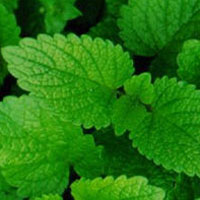Penn Herb Wellness Guide
Lemon BalmFind Products
 © Steven Foster
© Steven FosterHow It Works
The terpenes, part of the pleasant smelling volatile oil from lemon balm, are thought to produce this herb’s relaxing and gas-relieving (carminative) effects. Flavonoids, phenolic acids, and other compounds appear to be responsible for lemon balm’s anti-herpes and thyroid-regulating actions. Test tube studies have found that lemon balm blocks attachment of antibodies to the thyroid cells that cause Grave’s disease (hyperthyroidism).2 The brain’s signal to the thyroid (thyroid-stimulating hormone or TSH) is also blocked from further stimulating the excessively active thyroid gland in this disease. However, clinical trials proving lemon balm’s effectiveness in treating Grave’s disease are lacking.
One small preliminary trial studying sleep quality compared the effect of a combination product containing an extract of lemon balm (Melissa officinalis) and an extract of valerian root with that of the sleeping drug triazolam (Halcion). The effectiveness of the herbal combination was similar to that of Halcion, as determined by the ability to fall asleep and the quality of sleep.3 Another trial also found that the same combination of valerian and lemon balm, taken over a two-week period, is effective in improving quality of sleep.4
According to double-blind research, topical use of a concentrated lemon balm extract speeds healing time of herpes simplex virus sores (cold sores) on the mouth.5, 6
How to Use It
The German Commission E monograph suggests 1.5 to 4.5 grams of lemon balm in a tea several times daily.7 The herb can be steeped for ten to fifteen minutes in 150 ml of boiling water to make the tea. Tincture can also be used at 2 to 3 ml three times per day. Concentrated extracts, 160 to 200 mg 30 minutes to one hour before bed, are sometimes recommended for insomnia. Highly concentrated topical extract ointments for herpes can be applied three to four times per day to lesions.
Lemon balm is frequently combined with other medicinal plants. For example, peppermint and lemon balm together are effective for calming upset stomach. Valerian is often combined with lemon balm for insomnia. Bugleweed (Lycopus virginicus) and lemon balm have been used together for Graves’ disease.
Copyright 2025 TraceGains, Inc. All rights reserved.
Learn more about TraceGains, the company.
The information presented by TraceGains is for informational purposes only. It is based on scientific studies (human, animal, or in vitro), clinical experience, or traditional usage as cited in each article. The results reported may not necessarily occur in all individuals. Self-treatment is not recommended for life-threatening conditions that require medical treatment under a doctor's care. For many of the conditions discussed, treatment with prescription or over the counter medication is also available. Consult your doctor, practitioner, and/or pharmacist for any health problem and before using any supplements or before making any changes in prescribed medications. Information expires December 2025.


